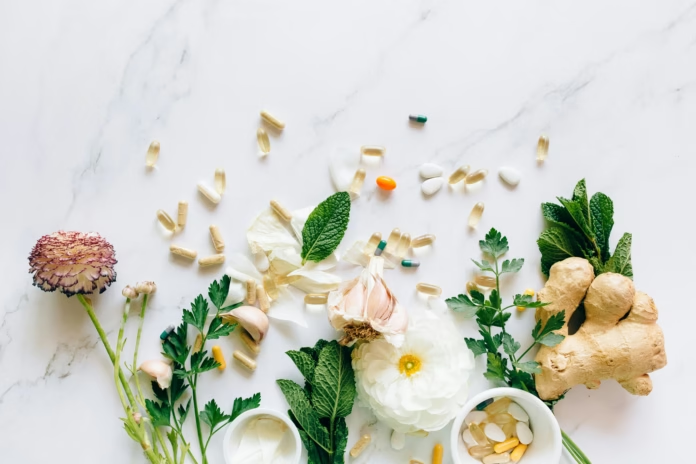Your gut health isn’t just about digestion. The trillions of bacteria living in your digestive system shape how your body processes food, fights off illness, and even controls body odors that can get awkward in social situations.
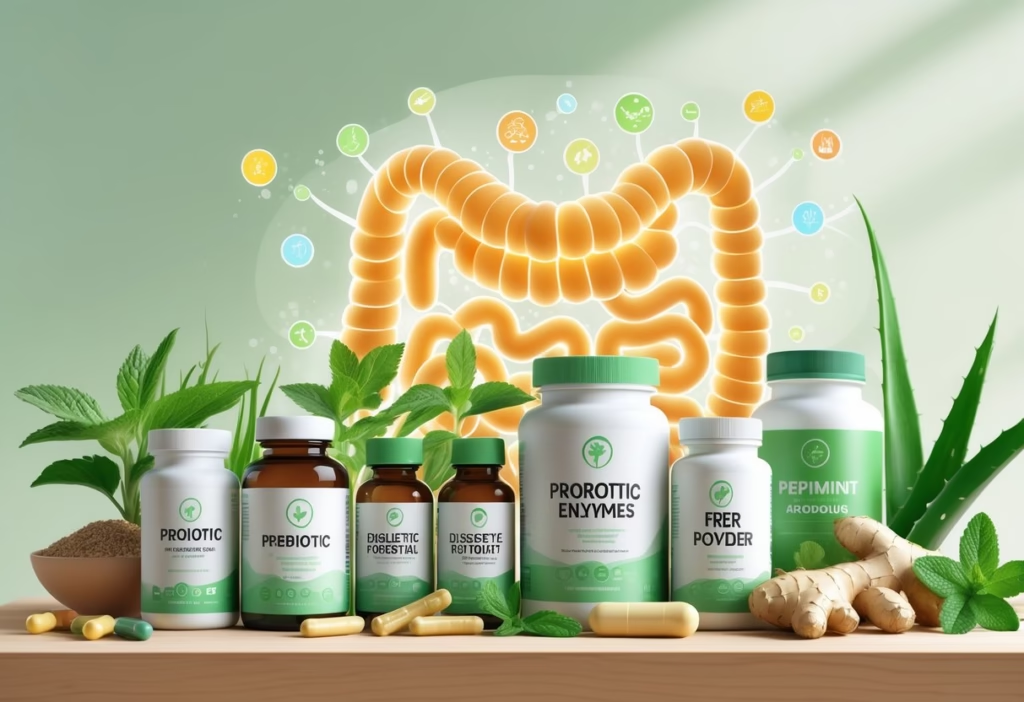
Certain supplements can help balance your gut bacteria, improve digestion, and reduce unwanted body odors by supporting a healthy microbiome. When harmful bacteria outnumber the good, they churn out compounds that lead to bad breath, digestive problems, and other not-so-pleasant smells.
The right mix of probiotics, prebiotics, digestive enzymes, and gut-healing nutrients can really help restore balance in your digestive system. These supplements work together to strengthen your gut lining and reduce inflammation.
They also create a friendlier environment for beneficial bacteria, keeping the bad guys in check. It’s a bit like tending a garden—what you feed grows.
How Supplements Influence Gut Health and Odor
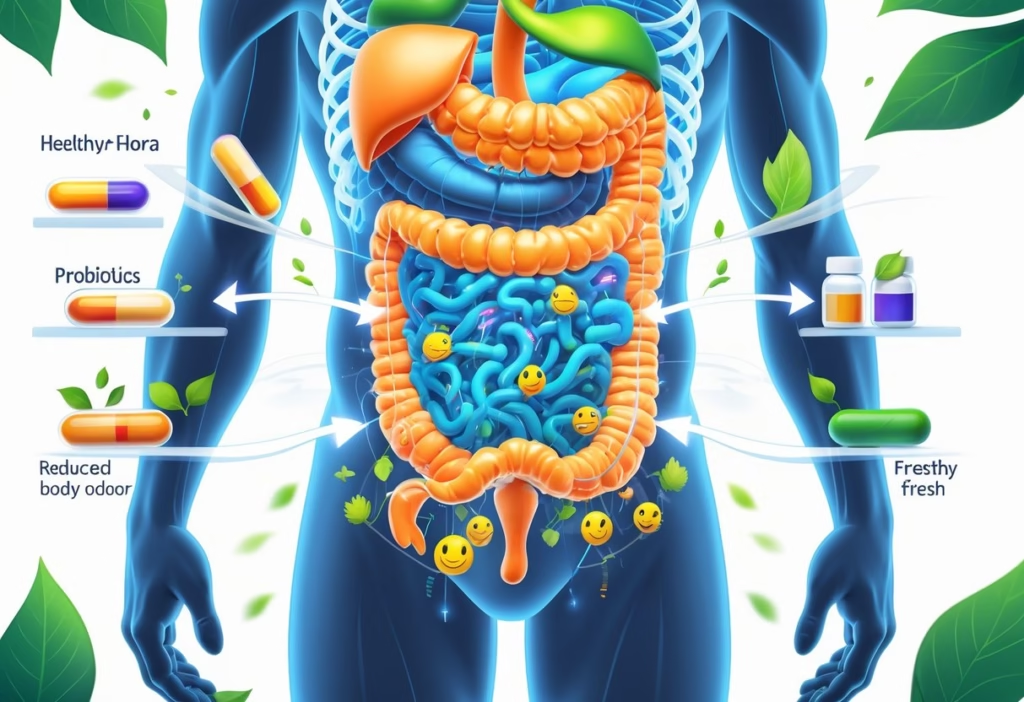
Supplements target the gut microbiome to restore bacterial balance and improve digestion. This balance cuts down on harmful bacterial overgrowth, which is often behind those embarrassing odors.
Supporting your gut can also boost immune function and even affect mental health. It’s surprising how much is connected to what’s happening in your gut.
Understanding the Gut Microbiome
The gut microbiome is home to trillions of bacteria. These microscopic residents directly influence digestive health and the production of odors.
When good bacteria outnumber the bad, your digestive system runs smoother and you’ll notice fewer offensive smells. But when things get out of balance, it’s a different story.
Harmful bacteria create strong-smelling compounds as they break down food. These bacteria thrive if you’re eating poorly or feeling stressed—yep, stress really does mess with your gut.
Probiotics help restore bacterial balance by introducing beneficial strains like Lactobacillus and Bifidobacterium. These good guys can crowd out the odor-producing troublemakers.
The microbiome also supports your immune system. A healthy balance means fewer flare-ups and less inflammation, which is always a win.
Key bacterial strains for odor control:
- Lactobacillus acidophilus – reduces gas production
- Bifidobacterium longum – improves protein digestion
- Streptococcus thermophilus – breaks down lactose
Digestive System and Odor Formation
Poor digestion gives odor-causing bacteria a perfect playground. If food lingers too long in your intestines, harmful microbes break it down into all sorts of smelly stuff.
Digestive enzymes help break down food more completely, so there’s less undigested material for those bad bacteria to feast on. That directly cuts down on gas and odor.
Common digestive issues that increase odors:
- Slow stomach emptying
- Poor protein breakdown
- Inadequate fiber digestion
- Bacterial overgrowth
Fiber supplements feed your good bacteria and help move things along. Soluble fiber supports regular bowel movements, reducing the time harmful bacteria have to make trouble.
The digestive system is tied to your brain through the gut-brain axis. When digestion improves, you might even notice your mood and stress levels getting a boost—funny how it all connects.
Links Between Gut Health and Overall Wellbeing
Gut health touches so many parts of your life. It even plays into weight management and brain function, believe it or not.
If your gut’s out of whack, you might see weight gain thanks to inflammation or hormone issues. The immune system? About 70% of your immune cells live right in your digestive tract. That’s huge.
Gut health impacts on body systems:
| System | Effect |
|---|---|
| Immune | Supports infection resistance |
| Mental Health | Produces mood-regulating chemicals |
| Weight | Controls hunger hormones |
| Brain Function | Affects memory and focus |
Mental health and gut health are more connected than most people realize. Beneficial bacteria actually produce neurotransmitters like serotonin, which can help with mood and even anxiety-related digestive issues.
Supplements that support gut barrier integrity like L-glutamine help keep the intestinal lining strong. That barrier stops harmful stuff from leaking into your bloodstream and sparking inflammation everywhere.
Probiotics: Balancing Beneficial Bacteria
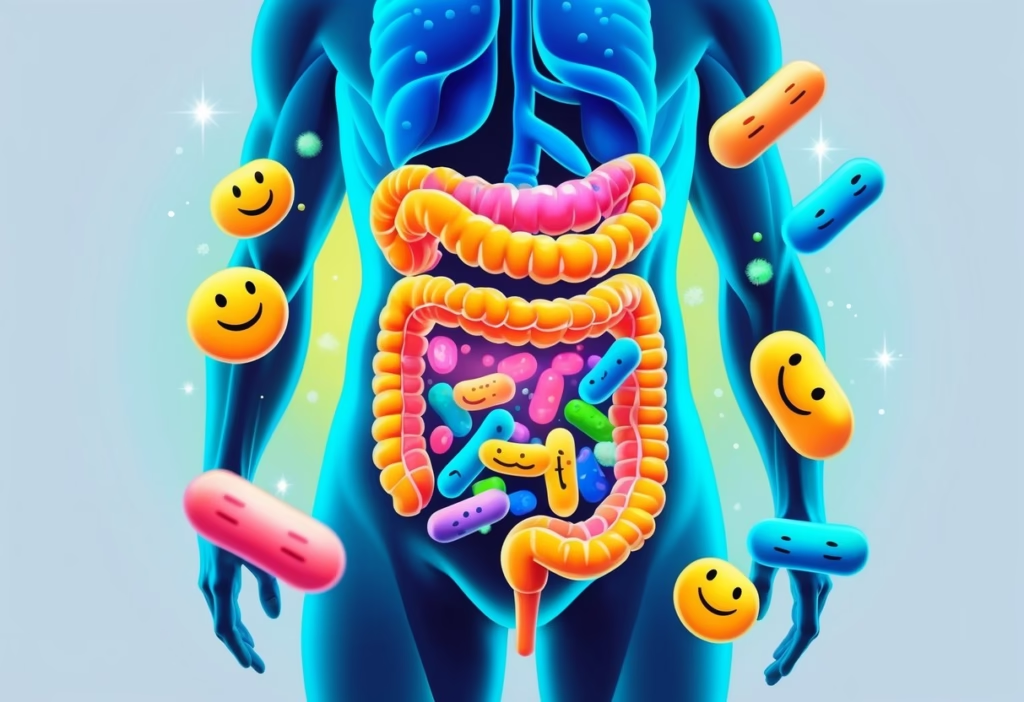
Probiotics are living microorganisms that help restore your gut’s bacterial balance. They also reduce digestive odors, which is a nice bonus for anyone who’s self-conscious about that.
Specific strains like Lactobacillus acidophilus and Akkermansia muciniphila each have their own strengths, from supporting immune function to targeting different parts of gut health.
Key Probiotic Strains for Gut Support
Lactobacillus acidophilus is one of the most researched strains for digestive health. It produces lactic acid, creating an acidic gut environment that keeps harmful bacteria in check.
Studies show it can reduce gas and bloating, plus it helps break down proteins more efficiently—so, less chance for putrefaction odors. That’s a relief.
Lactobacillus plantarum is another standout. It produces enzymes that help digest complex carbs, which means fewer undigested sugars for bad bacteria to munch on.
Interestingly, this strain survives stomach acid better than many others. That makes it more likely to reach your intestines alive and kicking.
Bifidobacterium lactis is especially helpful in the large intestine. It keeps pH levels balanced, which discourages bacteria that create sulfur compounds and other nasty-smelling gases.
The most clinically studied strains include these three, so you’re not just rolling the dice with your gut health.
Role of Akkermansia muciniphila in Odor Reduction
Akkermansia muciniphila is a bit of a newcomer, but it’s getting a lot of attention. This probiotic targets the gut lining by feeding on mucin—the protective mucus layer inside your intestines.
By munching on old mucin, it encourages your body to make fresh, healthy mucus. That means a stronger gut barrier and less inflammation, so fewer byproducts that contribute to odors.
Akkermansia also produces short-chain fatty acids, which lower intestinal pH. That’s good news for beneficial bacteria and bad news for harmful ones.
People with higher levels of Akkermansia tend to have better gut barrier function. An intact barrier means fewer bacteria sneaking into the small intestine, which is a common source of gas and odors.
This strain works a bit differently than the usual suspects like lactobacillus. While those produce lactic acid, Akkermansia focuses on strengthening the physical barrier between your gut and the rest of your body.
Supplements with Akkermansia are still pretty new, but they’re promising for anyone looking for all-around gut support.
Choosing Effective Probiotic Supplements
CFU count tells you how many live bacteria are in each dose. Most effective supplements have between 10 and 50 billion CFUs per serving.
But don’t get caught up in chasing the highest number—strains matter more than sheer quantity.
Multi-strain formulas usually work better than single-strain products. Probiotics help maintain the balance of your gut microbiome by offering a variety of bacteria.
Enteric coating is key. Look for capsules with acid-resistant or delayed-release tech so the bacteria survive the trip through your stomach.
Storage requirements are all over the place. Some need refrigeration, others are shelf-stable. Go with what fits your lifestyle so you’ll actually remember to take them.
Third-party testing is a must. Reputable brands will show proof their supplements contain what they claim.
If you’re new to probiotics, start low and slow. Most people see less gas and bloating in a couple of weeks, but everyone’s gut is a little different.
Prebiotics and Fiber: Fueling a Healthy Microbiome
Prebiotics provide fuel for your healthy bacteria and help create an environment where beneficial microbes can really take off. Unlike regular fiber, certain types like inulin and galacto-oligosaccharides (GOS) are especially good at reducing the bad bacteria that make those funky-smelling compounds.
Inulin and Galacto-Oligosaccharides (GOS)
Inulin is like a selective fertilizer for good bacteria in your colon. This soluble fiber passes through your small intestine untouched and gets fermented by beneficial bacteria in the large intestine.
Prebiotic fibers support gut health by fueling the growth of good bacteria. Bifidobacterium and Lactobacillus strains seem to love inulin more than anything else on the menu.
GOS works a lot like inulin but feeds different bacterial strains. It encourages microbes that make short-chain fatty acids—not gas-forming compounds, thankfully.
Key differences between inulin and GOS:
- Inulin: Found in chicory root, garlic, onions
- GOS: Derived from lactose, found in legumes
- Fermentation rate: GOS ferments slower than inulin
- Gas production: GOS usually causes less bloating
Both types of prebiotics shift your gut bacteria toward species that make less odorous waste. They also help strengthen your gut’s barrier, so fewer toxins sneak into your system.
It’s not a quick fix, but with time and consistency, your gut—and your nose—will thank you.
Chicory Root and Soluble Fiber Sources
Chicory root is probably the king of inulin. Among natural sources, it’s got the highest concentration out there.
Just one serving gives you about 5 to 10 grams of prebiotic fiber. That fiber is what your good gut bacteria crave.
Other options for soluble fiber? Think psyllium husk, acacia gum, and partially hydrolyzed guar gum.
These fibers dissolve in water. They turn into a gel-like substance as you digest them—kind of cool, actually.
Top prebiotic fiber sources:
| Source | Fiber Content | Primary Prebiotic |
|---|---|---|
| Chicory root | 65% inulin | Inulin |
| Jerusalem artichoke | 15-20% | Inulin |
| Psyllium husk | 85% fiber | Mucilage |
| Acacia gum | 90% fiber | Arabinogalactan |
Dietary fiber feeds beneficial gut bacteria and supports regular bowel movements. Soluble fiber, in particular, creates an acidic environment inside you that makes it tough for the nastier, putrefying bacteria to thrive.
Those less-friendly bacteria—yeah, they’re the ones that make hydrogen sulfide, indole, and skatole. Those are the main culprits behind foul digestive odors.
Prebiotic Effects on Digestive Smells
Prebiotics are non-digestible fibers that serve as food for beneficial gut bacteria. They actually change the types of compounds your gut produces during fermentation.
Instead of sulfur-y gases, beneficial bacteria make things like acetate, propionate, and butyrate. These are short-chain fatty acids that don’t stink up the room.
When you get regular with prebiotics, you’ll see a drop in Clostridium and Bacteroides species. These guys are the ones breaking down proteins into ammonia and sulfur stuff—basically, the reason for those strong, unpleasant odors.
Stick with prebiotic supplements for two to four weeks and the fermentation process inside you starts to shift. The good bacteria multiply and push out the odor-makers through sheer numbers.
Odor reduction mechanisms:
- Lower protein fermentation in the colon
- Increased production of pleasant-smelling short-chain fatty acids
- Faster transit time reduces putrefaction
- Improved intestinal pH inhibits harmful bacteria
Prebiotic usage has multiple benefits for gut health including reduced gas production and improved digestive regularity.
Digestive Enzymes and Specialized Supplements
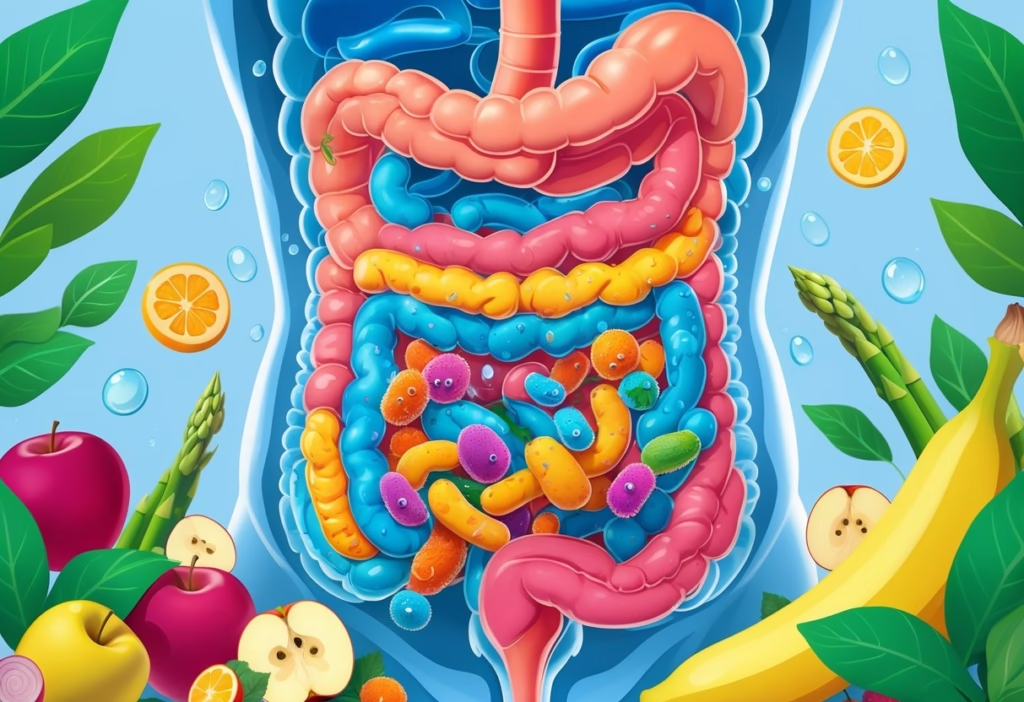
Digestive enzymes help break down food. Magnesium and peppermint oil deal with specific digestive issues that can make you gassy or uncomfortable.
These targeted supplements each work a bit differently. Some reduce bloating, others support your overall digestive function. It’s not a one-size-fits-all situation.
Enzymes for Gut Comfort and Reduced Odors
Digestive enzymes break down food bits that might otherwise just sit and ferment in your gut. There are three main types: amylase (for carbs), protease (for proteins), and lipase (for fats).
Alpha-galactosidase helps reduce gas from beans and cruciferous veggies. This enzyme tackles complex sugars that usually become fuel for gut bacteria.
Common digestive enzymes include:
- Amylase for starches and sugars
- Protease for meat and protein sources
- Lipase for oils and fatty foods
- Alpha-galactosidase for beans and vegetables
If you’re lactose intolerant, lactase supplements are a lifesaver. They keep undigested lactose from hitting your colon and turning into gas.
Digestive enzyme supplements work best with meals. Timing matters—take them when you eat so they can do their job right there with your food.
Magnesium and Its Laxative Effects
Magnesium helps keep things moving. It pulls water into your intestines, which softens stool and makes it easier to go.
This mineral relaxes colon muscles. You’ll notice the difference, especially if you’re dealing with constipation.
Magnesium citrate is the go-to for quick relief. It absorbs well and acts fast—sometimes too fast if you’re not used to it.
Magnesium oxide is a bit gentler. People who need long-term support often reach for this one.
Watch your dose. Too much magnesium can lead to loose stools or even diarrhea, especially if you’re sensitive.
Regularity matters. When waste spends less time in your colon, there’s less chance for bacteria to ferment it and create odors.
Peppermint Oil for Digestive Relief
Peppermint oil relaxes intestinal muscles. The menthol in it acts as an antispasmodic, easing cramps and discomfort.
Enteric-coated peppermint oil capsules are smart—they don’t break down in your stomach. Instead, they make it to your small intestine, where you get the most benefit.
Studies show peppermint oil eases symptoms for people with irritable bowel syndrome. It cuts down on bloating, gas, and those annoying abdominal pains.
Peppermint oil works by blocking calcium channels in smooth muscle. That means fewer spasms and less trapped gas.
Peppermint oil capsules usually have 0.2 to 0.4 milliliters per dose. Most folks take one or two between meals for best results.
Addressing Common Digestive Concerns
Different digestive issues call for different supplements. It’s not always obvious what’ll help with bloating, irregularity, or food sensitivities.
Targeted nutrients can make a big difference, not just for symptoms but for your gut barrier too. Sometimes it takes a little experimenting to find what works.
Supplements for Irritable Bowel Syndrome and IBD
Peppermint oil is a standout for IBS symptoms. IBgard reduces cramping and urgency with its unique coating that releases peppermint oil in the right spot.
Research backs it up—peppermint oil relaxes smooth muscle in the gut. Less spasm, less pain, no matter which IBS subtype you have.
L-glutamine supports gut healing for both IBS and inflammatory bowel disease. This amino acid repairs your gut lining and calms inflammation. Most people take 5 to 15 grams daily, usually on an empty stomach.
Soluble fiber like methylcellulose is another tool for IBS. The American College of Gastroenterology recommends it for all IBS types since it normalizes bowel movements without causing extra gas.
Managing Constipation, Diarrhea, and Bloating
Magnesium citrate is a gentle fix for constipation. Magnesium is an easy, gentle, and well-studied solution—sometimes it even outperforms fiber for chronic constipation.
Most people start with 400 to 1000 mg at bedtime. If you’re new to it, go slow to avoid loose stools.
Calcium polycarbophil is great for diarrhea and urgency. FiberCon has impressive bulking power; it soaks up to 60 times its weight in water, making loose stools much firmer.
Psyllium husk is versatile. It helps with both constipation and diarrhea by forming a gel that bulks up stool or absorbs extra fluid, depending on what you need.
Support for Leaky Gut and Intestinal Permeability
L-glutamine is the main fuel for your gut cells. It helps tighten up the spaces between them, so stuff doesn’t leak through where it shouldn’t. Most experts suggest 10 to 15 grams a day, split up into a few doses.
Zinc carnosine supports your gut barrier and helps heal any damage. This combo of zinc and carnosine absorbs well and targets the gut lining directly.
Collagen peptides give your body the building blocks it needs for gut repair. Glycine, proline, and hydroxyproline in collagen help tissues regenerate. Taking 10 to 20 grams daily keeps your gut lining in good shape.
Probiotics restore the good bacteria that support your gut barrier. Multi-strain formulas with 10 to 50 billion CFUs tend to be the most effective for leaky gut.
Targeted Relief for Lactose and Gluten Sensitivities
Lactase enzymes are essential if you’re lactose intolerant. Nature’s Way has enough lactase to handle a high-lactose meal, with 10,350 units per capsule.
Taking 1 to 3 capsules at the start of a dairy-heavy meal usually prevents gas, bloating, and diarrhea. The enzymes act fast, so you don’t have to worry about after-effects.
Digestive enzyme blends are helpful for gluten sensitivity. They often include DPP-IV enzymes, which break down gluten peptides more efficiently.
Betaine HCl helps if your stomach acid is low. Lots of people with food sensitivities struggle with this, making it harder to digest proteins like gluten and dairy.
Supporting the Gut Lining, Immune System, and Inflammation
A strong gut lining is your body’s first line of defense against harmful substances. It lets nutrients in, but keeps the bad stuff out.
When this barrier breaks down, you can end up with chronic inflammation and digestive odors that can really mess with your daily life. It’s worth paying attention to what your gut is telling you.
Anti-Inflammatory and Healing Supplements
Omega-3 fatty acids are some of the most powerful anti-inflammatory compounds out there, especially for gut health. They help repair damaged intestinal lining and seem to calm things down when inflammation flares up.
These essential fats actually tamp down inflammatory molecules and, interestingly, support the growth of good gut bacteria. Studies have found that omega-3 supplements can reduce gut inflammation and strengthen the gut barrier.
Fish oil is probably the most common source, giving you EPA and DHA. If you’re plant-based, algae oil is a solid alternative that still delivers those key fatty acids.
Aloe vera is another favorite for soothing inflamed gut tissue. The gel from this plant isn’t just for sunburns—it can ease irritation in your digestive tract and help cells regenerate after damage.
Some folks swear by a little aloe in their routine, especially if their gut feels raw or sensitive. It doesn’t work for everyone, but it’s gentle enough to try.
L-glutamine is an amino acid that acts as fuel for your intestinal cells. When you’re stressed or sick, your body can run low on it—so supplementing sometimes makes a difference in gut healing.
This one helps maintain the integrity of the gut lining. If you’re feeling run down, it might be worth a shot.
Zinc is crucial for tissue repair and immune support. If your zinc levels dip too low, you might notice slower healing and even issues like leaky gut syndrome.
It’s not the flashiest supplement, but sometimes the basics really matter. Zinc can quietly help the gut lining recover.
| Supplement | Daily Dosage | Primary Benefit |
|---|---|---|
| Omega-3 | 1000-2000mg | Reduces inflammation |
| L-glutamine | 5-15g | Repairs gut lining |
| Zinc | 15-30mg | Supports healing |
| Aloe vera | 50-200mg | Soothes irritation |
Role of Stress and Lifestyle in Gut Odors
Chronic stress messes with gut health in more ways than people realize. It reduces blood flow to the digestive system and can throw off your gut bacteria balance.
When stress hormones stay high, the intestinal lining gets weaker and inflammation ramps up. It’s a frustrating feedback loop—stress makes your gut worse, and a cranky gut makes you more stressed.
The gut-brain connection is real. Anxiety and depression aren’t just in your head—they can worsen digestive symptoms and even contribute to odor issues.
Mental health conditions often line up with imbalanced gut bacteria and a leakier gut barrier. It’s all connected, whether we like it or not.
Poor sleep quality is another sneaky culprit. If you’re not getting at least 7-9 hours of solid sleep, your body can’t repair the gut lining the way it should.
That means more inflammation, slower healing, and sometimes, digestive issues that just won’t quit. Anyone else notice their gut acts up after a rough night?
Lifestyle tweaks can help, even if they’re not magic bullets. Some approaches that genuinely support gut healing include:
- Regular exercise—it boosts circulation and helps burn off stress hormones
- Meditation or deep breathing—these can nudge your body into rest-and-digest mode
- Consistent meal timing—your gut likes a routine more than you might think
- Adequate hydration—keeps that protective gut mucus flowing
Honestly, managing stress is easier said than done, but these strategies can make a noticeable difference. If gut odors and symptoms are getting in the way, it’s worth experimenting to see what helps you feel better day to day.
Interactions With Medications and Chronic Conditions
NSAIDs like ibuprofen can really mess with the gut lining if you use them often. They cut down on that protective mucus your gut needs, making digestive problems worse for some folks.
If you’re on blood thinners, it’s smart to check with your doctor before adding omega-3 supplements. Fish oil might actually boost the effects of those anticoagulant meds, which isn’t always what you want.
Chronic conditions add another layer of complication when it comes to gut health supplements. It’s not a one-size-fits-all thing:
- Type 2 diabetes: Blood sugar swings can encourage the growth of harmful bacteria in your gut, which, yeah, can make things smellier than you’d like.
- Celiac disease: Even if you’re popping healing supplements, you absolutely have to keep gluten out of the picture. No shortcuts here.
- Autoimmune conditions: Some probiotics, oddly enough, can ramp up the immune system too much. It’s a balancing act.
Food sensitivities—think soy or corn—can fire up inflammation even if they’re just sneaking in through supplements. It’s honestly worth squinting at those ingredient lists if you know certain foods don’t agree with you.
Antibiotics, while sometimes necessary, can throw your gut bacteria out of whack for months. Targeted supplements that support digestion and reduce inflammation start to matter a lot more, both during and after a course of antibiotics. It’s a rough road to get your gut back on track, but it’s doable.
Infections—whether from bacteria, yeast, or even parasites—often need to be tackled head-on before any healing supplements can really do their job. Clearing out those underlying bugs usually helps with odor and other symptoms more than just throwing supplements at the problem.
It’s honestly a bit overwhelming, right? With all these interactions, it’s easy to see why gut health isn’t just about popping a pill or two. Sometimes, you have to dig deeper, pay attention to your body’s signals, and maybe even ask for a little help from a pro. No shame in that.
